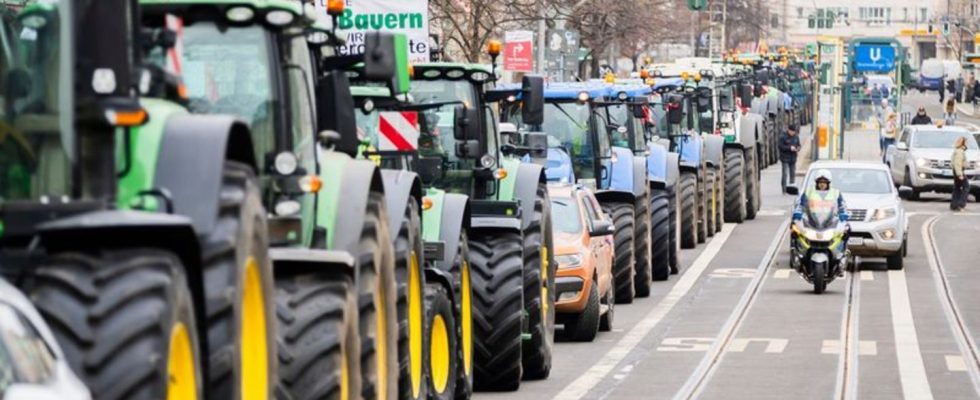Mediation Committee
New start for growth package
The Union only wants to agree to the law if the SPD, Greens and FDP waive the planned abolition of the tax break for agricultural diesel. photo
© Christoph Soeder/dpa
The Federal Council and Bundestag are fighting for tax aid for the ailing economy. And a hospital law was also stuck – but this dispute was quickly resolved.
In the dispute over the blocked With the traffic light coalition’s growth package, the federal and state governments have made an attempt to reach an agreement. Representatives of the Bundestag and Bundesrat met in the mediation committee in Berlin.
Agreement on clinics
The co-chair, Mecklenburg-Western Pomerania’s Prime Minister Manuela Schwesig (SPD), insisted on a solution at the start of the meeting. “I will work hard to ensure that we come to an agreement.” FDP parliamentary group leader Christian Dürr also called for movement. There was an agreement on a clinic law that was initially thwarted by the Federal Council.
Health Minister Karl Lauterbach (SPD) said that nothing now stands in the way of a decision being made in the Federal Council. The state chamber initially stopped the transparency law passed by the Bundestag. It is intended to create an online atlas on the range of services and treatment quality at 1,700 clinic locations nationwide.
The start is still planned for May 1st. The law also provides for billions of euros in additional liquidity for the clinics. The clinics should also receive a “transformation fund” with a view to a planned major hospital reform, for which 50 billion euros are planned for ten years from 2025. The federal and state governments should each share half the sum.
Biggest point of contention: Growth Opportunities Act
Before the meeting, Schwesig emphasized: “Citizens, hospitals and the economy expect little dispute and many solutions.” The biggest point of contention was the Growth Opportunities Act passed by the Bundestag, which provides tax relief for companies and an acceleration of approval procedures.
The Federal Council stopped it with the argument that the states would have to bear a large part of the costs. A compromise has already been developed that reduces the volume of relief from the previously planned seven billion euros annually to 3.2 billion euros. The Union-led states only wanted to agree to this if the traffic light renounced the Bundestag’s decision to abolish tax breaks for agricultural diesel for farmers.
Dürr said before the meeting that he could not understand why the Union was bringing agricultural diesel into the debate. “It is forbidden to mix unrelated things in this process.” Schwesig also emphasized: “If the Union had wanted agricultural diesel to be in the mediation committee today, it would have had to agree to its creation in the last Federal Council.”
The law was not put on the agenda in the state chamber at the beginning of February. Dürr told the mediation committee with a view to the economic downturn: “Germany now needs a strong signal for a good location.”
Hardened fronts
Shortly before the meeting, the fronts seemed to have hardened. Finance Minister Christian Lindner (FDP) again called on the Union to give up its blockade of the package. He said he would be happy to talk about corporate tax reform in the Bundestag in response to a question from a CDU/CSU member.
“So that you can make this demand credibly, the Union should start by agreeing to the Growth Opportunities Act.” Hesse’s Prime Minister Boris Rhein (CDU) told the German Press Agency: “We expect a strengthening package for the economy and agriculture. The federal government must become more committed to supporting the economy.” Economic policy is the responsibility of the federal government.
During the mediation process, among other things, a bonus for investments in climate protection, which was originally considered the core of the law, was overturned. Lindner emphasized that the idea of a bonus would be pursued further. “It seems that more work needs to be done to convince companies that such an instrument is particularly low-bureaucratic and predictable for companies. We will continue to make these efforts.”
The law also includes tax incentives to stimulate struggling housing construction. To promote investments, a declining balance of depreciation should be introduced, which will make it easier for certain costs to be written off for tax purposes. Special depreciation is to be substantially improved for small and medium-sized companies.
Mobile work machines: agreement expected
An agreement in the mediation committee was expected on regulations that affect owners of ride-on lawnmowers, forklifts and other mobile work machines with a maximum speed of up to 20 kilometers per hour.
According to dpa information, motor vehicle liability insurance will generally not be required for these machines in the future. At the beginning of February, the Federal Council made approval of the project dependent on such a change. Since the federal government wants to avoid fines that could result from the failure to implement an EU directive, it is keen to conclude the legislative process quickly.

